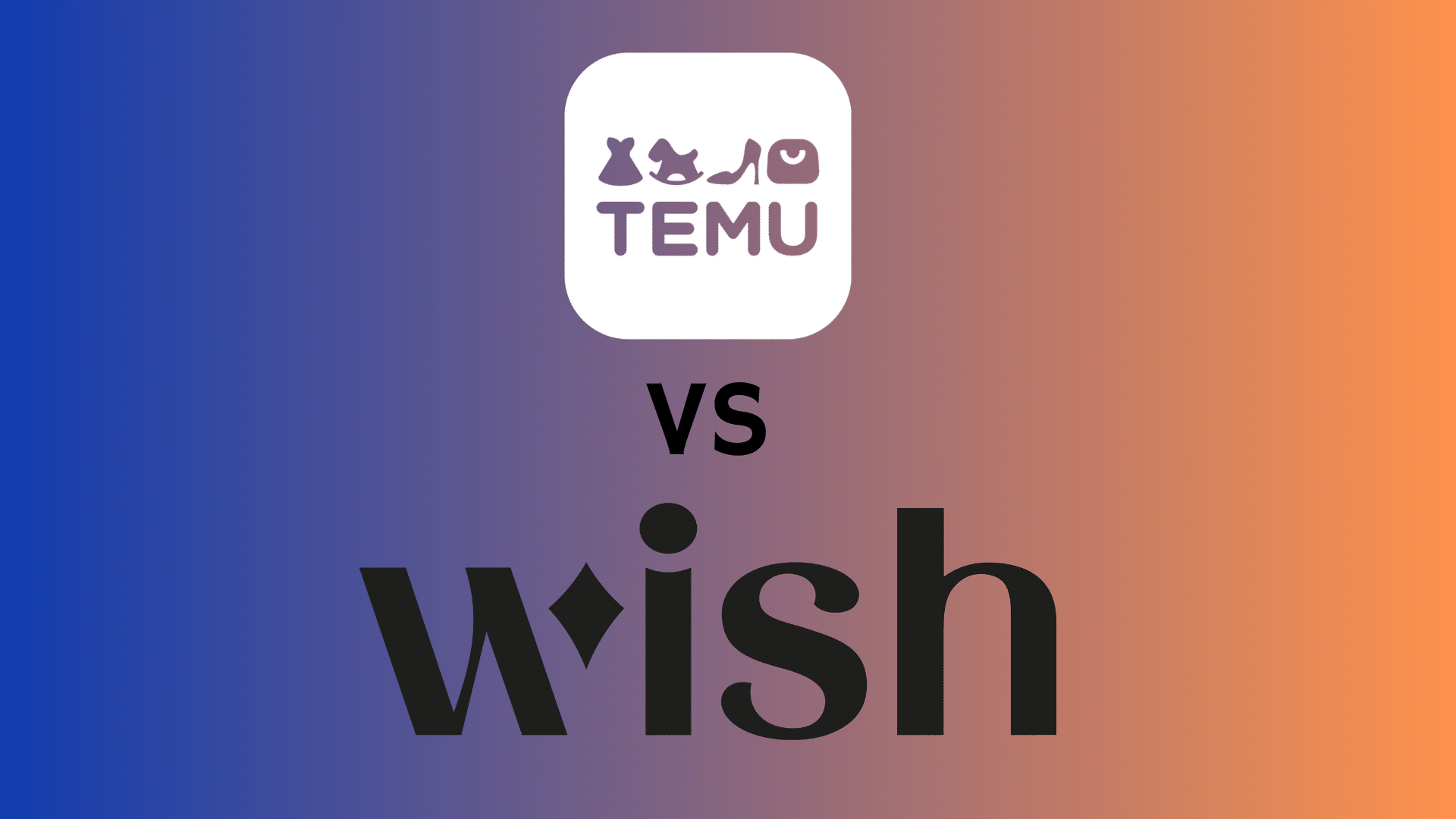If you’ve been scrolling through social media lately, you’ve probably come across ads for ecommerce giants Temu and Wish. These China-based online shopping platforms have taken the world by storm with their extensive product ranges and competitive prices.
Whether you’re looking for trendy fashion, well-priced gadgets, or a few budget toys for the kids, Temu and Wish offer plenty of options. But where will you get the best value, fastest shipping, and friendliest customer service? And what about all that bad press? Here’s everything you need to know in the battle of Temu vs Wish.
Temu vs Wish: Meet the Ecommerce Titans
Temu and Wish are popular online marketplaces known for their incredibly low prices and wide selection of products, including clothing, pet supplies, and cosmetics. Most of the products displayed on their ecommerce platforms are listed by Chinese vendors who ship to customers all over the world. This direct-to-consumer model allows Temu and Wish to set competitive prices.
What Is Temu?
Temu registered in Boston, USA in 2022. It has exploded in popularity, thanks in part to its influencer marketing strategy and the app’s gamified approach to shopping.
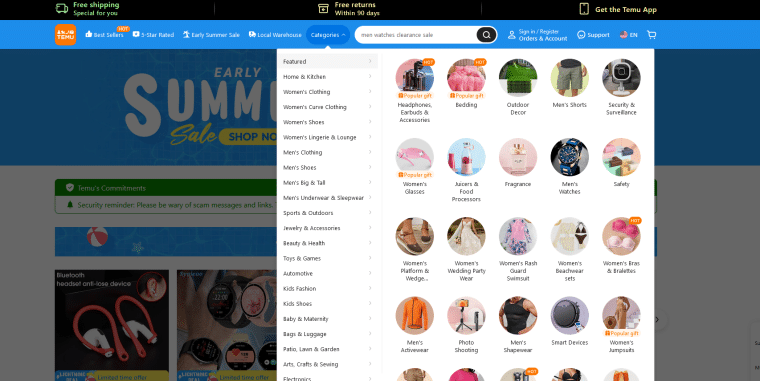
Temu was the most downloaded iPhone app in the US in 2023 and boasted more than 52 million downloads worldwide in January 2024. Almost a third of all small packages entering the US are either from Temu or competitor SHEIN.
The online shopping retailer is owned by parent company PDD Holdings, a Chinese company that moved its headquarters from the Cayman Islands to Ireland in 2023. It also owns the popular Chinese ecommerce platform Pinduoduo.
What Is Wish?
Wish was founded in San Francisco in 2010 by a former Google engineer. The app is known for significant discounts, freebies, and prize draws.

In 2018, Wish was the most downloaded online shopping app in the world and a major competitor to Amazon, with 90 million people worldwide using it at least once a month. It has long been known for its shocking low prices and generally poor product quality.
In the last 2 years, the app’s popularity has taken a tumble as newer competitors like Temu gained popularity. This could be a temporary shift or an indication that Temu offers better customer satisfaction.
Temu Vs Wish: Where To Shop?
Let’s take a look at how these rivals compare across 9 criteria.
1. Product Range
Both Temu and Wish offer a vast range of products in product categories like:
- Fashion
- Baby products
- Sports and outdoor gear
- Toys
- Health and beauty
- Home and garden
- Car accessories
- Arts and crafts
- Electronics and gadgets
Temu claims to have 25 million items listed on its site while Wish boasts 300 million – but to be honest, it’s hard to tell the difference.
Verdict: Draw. Both Temu and Wish are swimming in a vast selection of products of every description.
2. Pricing
Both apps offer absurdly low prices. We looked up a few items in different product categories on both sites to see how they compare.
Temu advertises wireless earbuds for £3.98. Wish has a similar product for £5.58. This is a 30% difference but in real terms it’s very little money.
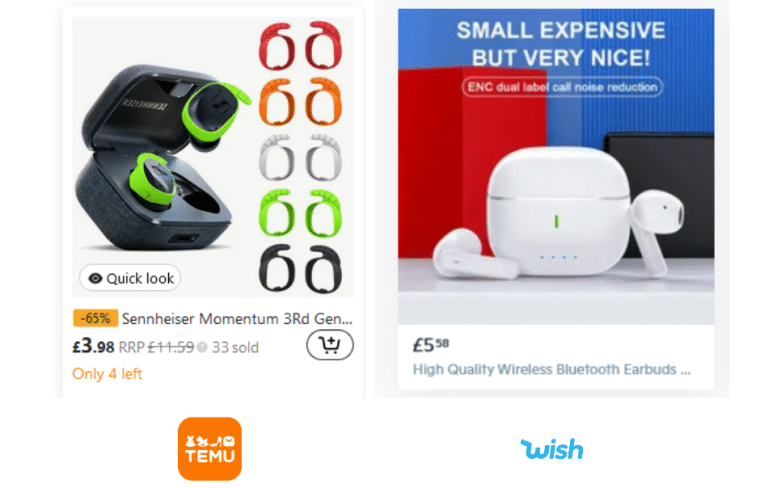
Temu and Wish list an identical-looking punching bag. Wish lists it at £10.82 while Temu prices it at £9.37. Again, Wish is slightly more expensive.
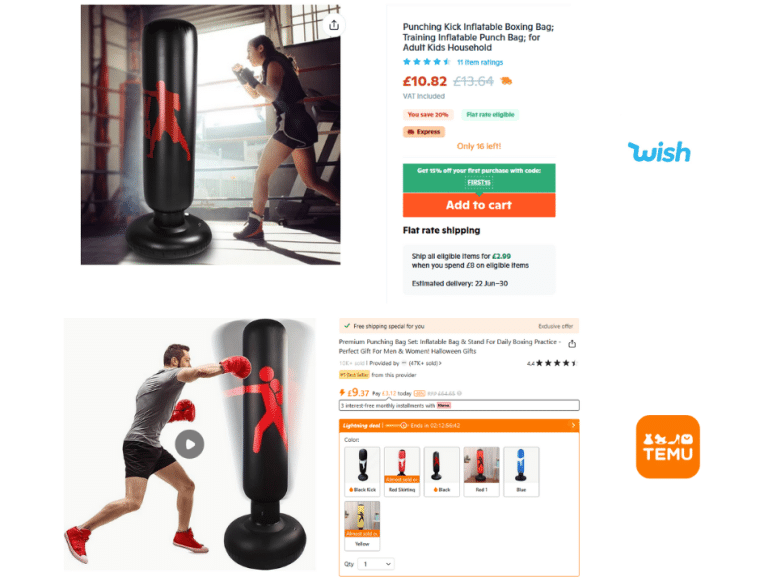
A linen shirt for women is advertised with the same photo on both apps – suggesting it may be from the same manufacturer. Wish is selling the shirt for £4.82 while Temu advertises it for a little over double that price.
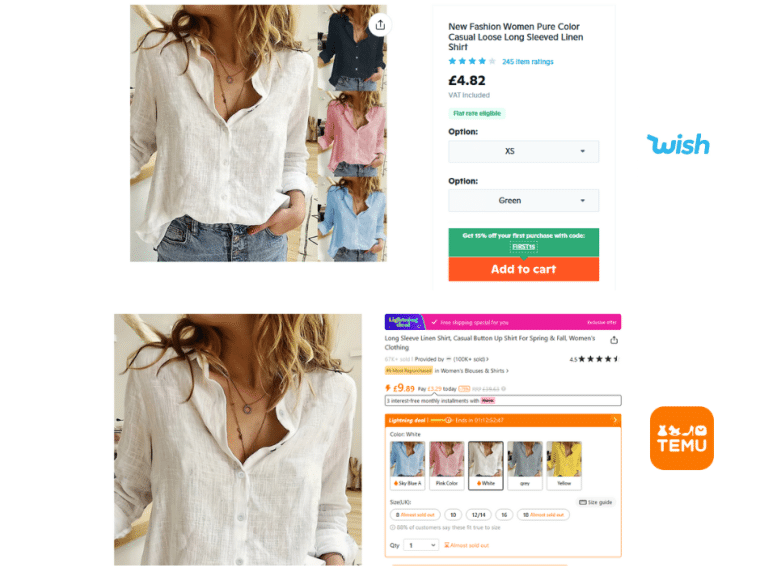
Verdict: Draw. Both Temu and Wish sell products at amazingly low prices.
Top Tip: Individual products may be available for lower prices on one of the two sites so compare before you buy.
3. Product Quality
Temu and Wish have received criticism for their product quality. However, Trustpilot reviews for Wish are mostly positive about product quality. The app has an average review score of 4.5 with satisfied customers saying candidly “you get what you pay for” and “don’t expect perfection”.
There are also reviews detailing products that are terrible quality or not as described. Many shoppers note that the sizing of clothing is inaccurate, so you should check the sizing charts against your measurements before making a purchase.
Temu has a considerably lower review score on Trustpilot – at 3.0 – with many reviews mentioning poor product quality. On Facebook, many reviewers mention defective gadgets and clothes falling apart in the wash.
But many shoppers say Temu is good value and the product quality is what they expected for low-priced products. Several reviewers on Trustpilot go so far as to say the product quality exceeded their expectations.

Verdict: Although both sites have issues with product quality, Wish wins this category because of its review score.
Top Tip: Shoppers should manage their expectations, read product descriptions carefully, and check reviews before making a purchase on either site.
4. Shipping Times and Fees
Temu provides two shipping options.
- Standard shipping takes 6 to 22 days and is free on all orders shipped by Temu.
- Express shipping takes 4 to 11 days. It costs $12.90 or is free on orders over $129 for orders shipped by Temu.
If your order is late, you’ll receive a credit of $5 for standard shipping or $13 for express shipping.
If your order is shipped directly from one of Temu’s providers, the free shipping thresholds will be different. Many providers offer free shipping for orders over $30. Your shipping options and prices will be visible before you complete your purchase.

On Wish, shipping fees and expected shipping times vary by item and location. Shipping options are listed alongside every product. Wish offers 5 shipping options:
- Standard Shipping: Generally around 7 to 14 days.
- Wish Express: Takes an average of 5 to 10 working days but can be as short as 2 days after purchase. Items that are eligible for Wish Express feature an orange truck icon. Express shipping usually costs anywhere from $3 to $7.
- 2 Day Delivery: Available only for eligible items and locations at variable costs.
- Flat Rate Shipping: In the US, this means you pay a $2.99 shipping fee for your order if you spend more than $10 on eligible items. Flat rates differ by country.
- Ship to Store: You can choose to have some items shipped to a local store instead of your home. In many cases, ship-to-store is available at a flat rate of $0.99.
Every Wish order has a Refund Eligible date. If your order doesn’t arrive by that date, you can request a refund.
Verdict: Wish wins. If you’re not in a rush, the fact that Temu offers free shipping for standard delivery is an advantage. However, Wish has lower shipping costs and shorter shipping times overall, and late deliveries are refunded. Its ship-to-store option is a bonus if you’re not home during the day.
Top Tip: Beware – shipping costs can change once you’ve added an item to your cart.
5. Returns and Refunds
Wish’s refund policy allows buyers to return products within 30 days post-delivery if they’re not 100% happy with their items and receive a full refund for the item and the shipping fee. Its refund policy also promises refunds for late items.
Temu’s refund policy includes a longer return window of 90 days from the purchase date, with the first return being free. Refunds are not offered for late delivery, but customers are offered a credit of $5 or $13 instead (depending on the shipping method).
Despite these refund policies, reviewers for both companies say they have been refused refunds for items that were unsatisfactory, were asked to pay shipping fees for returns, or had such a hard time dealing with customer service that they gave up on the refund.
Verdict: Draw. Users of both apps complain that they were not given refunds that they deserved.
6. User Experience
Both Wish and Temu have bright, attractive websites and apps that are easy to navigate. You can easily search for items and view their review rating.
However, it is frustrating that Wish’s shipping times and fees can change once you add items to your cart. Wish reviewers also mention issues with the payment system that were problematic enough to make them abandon their carts. It’s quite difficult to find FAQs and other information on its website too.

The biggest complaint from Temu reviewers with regard to user experience is that it is difficult to unsubscribe from text messages and emails. Users say they were bombarded with content as soon as they signed up and could not successfully opt out.
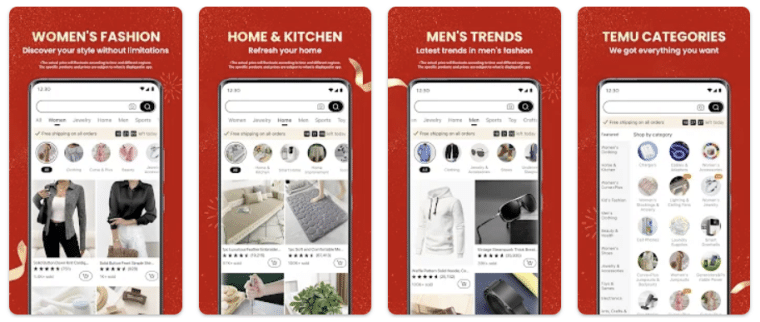
Verdict: Draw. Temu’s marketing spam and Wish’s site issues are both deal breakers for some shoppers.
7. Payment and Credit Options
Both Temu and Wish accept major credit cards, including Visa, Mastercard, American Express, and Discover, as well as PayPal, Google Pay, and Apple Pay.
In addition, both platforms accept buy now pay later services Klarna and Afterpay.
Temu customers can also pay with CashApp, Venmo, Affirm, or Temu Credit. Temu Credit can be earned by participating in Temu promotional events, as compensation for late delivery, or as an alternative to a cash refund for returned, faulty, or missing products.

Wish also accepts Ebanx (Credit Card, Boleto, Oxxo), Pix, and iDeal.
Verdict: Draw. Both platforms offer a good range of payment options and credit tools.
8. Customer Service and Support
Wish has a help page that has lots of information about common problems such as payment processing issues or missing packages. It also has an AI chatbot and Live Chat options on weekdays during work hours.
Temu has a help page and offers customer service via email, live chat, and over-the-phone support. You can also message Temu via its social media pages.
Both apps have mixed reviews when it comes to customer service. Plenty of 5-star reviews describe friendly, helpful customer service agents resolving problems swiftly. But plenty of 1-star reviews describe hours spent trying to get a problem resolved to no avail. Customers say they were denied refunds for faulty items, sent in circles by a chatbot, or that missing items could not be located.
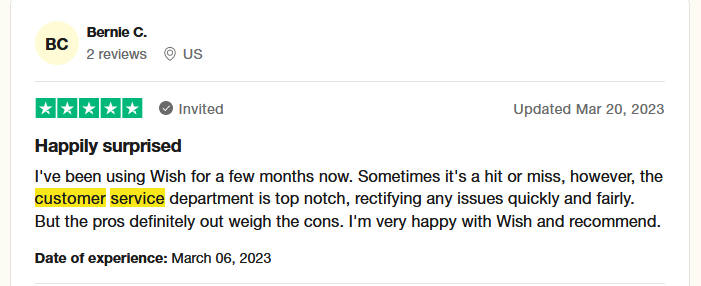
The Better Business Bureau gives businesses scores based largely on how many complaints they receive and how they deal with those complaints. They rate Temu C+ and Wish A+.
Verdict: While both companies have concerning reviews, Wish wins for its higher BBB rating.
9. Security and Safety
There are lots of potential safety and security issues to consider when shopping online, even when you’re dealing with well-known brands like Temu and Wish. Let’s look at the most important ones.
Dodgy Discounts
British consumer protection organization Which? found that Wish had advertised Huawei’s flagship smartphone, the P30 Pro, as reduced from £2,081 to £64.22 – a pretty impressive discount. However, the P30 Pro was only £899 when it launched and typically sells at £492.
Many products on both Temu and Wish list significant discounts but be aware that it’s impossible to know if the product was ever listed at the full price.
Data Privacy
Experts in cybersecurity and data privacy have raised concerns about Temu’s privacy practices, i.e. the data it collects from customers and whether it might end up in the hands of the Chinese Communist Party. Pinduoduo, a shopping app from the same parent company as Temu, was found to feature malware that spied on users.
Most of Wish’s third-party sellers are based in China which means it is the subject of similar concerns. Wish’s privacy policy says, “At times, personal data may be transferred to service providers or systems in countries that may not offer a level of data protection equivalent to that in your country.”
Consumer Protection Issues
It’s not clear that online marketplaces like Temu are subject to the same consumer protection rules as other ecommerce retailers. If something goes wrong, customers might not be able to access recourse in the same way they could if, say, Gap or Walmart failed to deliver their order.
Wish is a US company, headquartered in San Francisco so it is subject to US law. However, third-party sellers based in China may not always operate according to US law.
Product Safety
Consumer protection organization Which? purchased various products from Temu and ran safety tests. The electric heaters they tested were found to be unsafe and couldn’t legally be sold in the UK. An organization called Toy Industries of Europe purchased 19 toys from Temu. None complied fully with EU law and 18 “posed a real safety risk for children”.
Similarly, a car seat from Wish did not meet the UK’s legal standards for safety. France previously ordered search engines and app stores to de-list Wish because of unsafe appliances listed on the ecommerce platform but it has since allowed Wish to be reinstated.
Counterfeit Products
Pinduoduo has been placed on the US Trade Representative’s Office’s blacklist of companies that fail to stop the sale of counterfeit goods. Designers have accused Temu of copying their products, too. A consumer rights group identified a counterfeit phone and headphones on the Wish app (and reviewers note that this is a common problem with Wish).
Verdict: Draw. There are some security and safety risks with both ecommerce platforms. If you read product reviews and think carefully before you purchase, you should be able to shop safely.
Temu vs Wish In the News
According to a US investigation, there is an “extremely high risk” that forced labor is used in Temu’s supply chain. This is a potential moral issue for Temu customers.
Meanwhile, The New York Times writes that Wish intentionally listed items that violated its policies and potentially didn’t exist, selling those “items” to over 200,000 people, as an experiment. Former Wish employees add that illegal and misleading posts were often not taken down.
Temu vs Wish: Which Is Best for Affiliates?
Affiliate programs allow individuals to earn commission by promoting a company’s products through their social media pages or personal sites. Both Wish and Temu have an affiliate program. Here’s how they compare.
Temu’s affiliate program offers a 5-20% commission on qualifying purchases. Affiliates also earn bonuses for new user downloads. Top affiliates earn more than $5,000 per month but it’s realistic to aim for $100 or $200 at first.
Wish gives affiliates $50 in Wish Cash per month to buy products to promote and offers a 7% commission on qualifying purchases. Affiliates who post at least 1 video per month also earn $100 per campaign.
If you can achieve the 20% commission rate, Temu may offer higher earnings in the long run for successful affiliates, but Wish’s monthly credit and $100 payments are steady, reliable income.
Temu vs Wish: Which Platform Is Right for You?
Who wins in the battle of Temu vs Wish? The truth is, it depends on your preferences. Both offer low prices and a vast range of products.
If you want to get your products quickly, Wish Express may be a deciding factor. Wish also seems to edge out Temu when it comes to user experience, product quality, and customer satisfaction.
However, both Temu and Wish have issues with undelivered items and poor product quality so, whichever app you use, make sure you assess the merchants on that platform by reading product reviews when you’re online shopping.
